Campus News
A public dedication in the name of civil rights
Hundreds of campus and regional community members gathered beneath the redwoods encircling Quarry Amphitheater to watch the former College Ten make history, rededicating itself as John R. Lewis College in memory of the legendary civil rights leader.

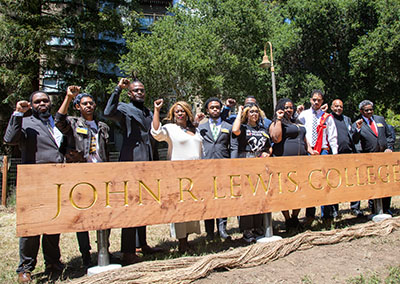
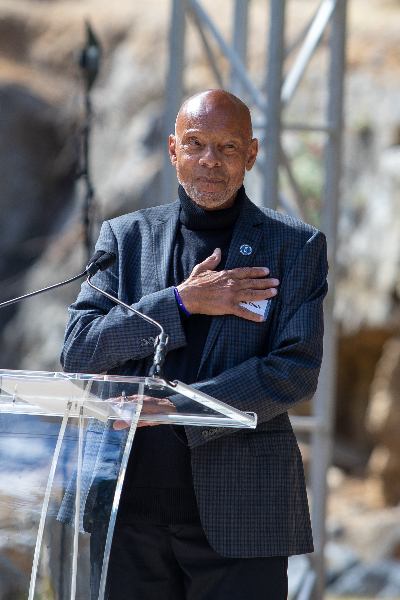
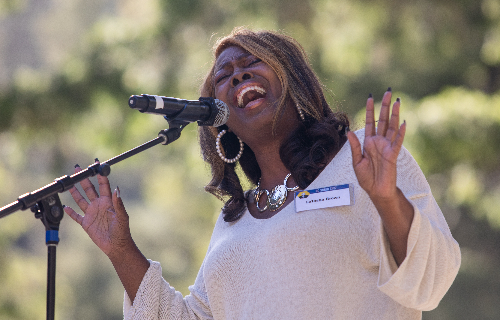
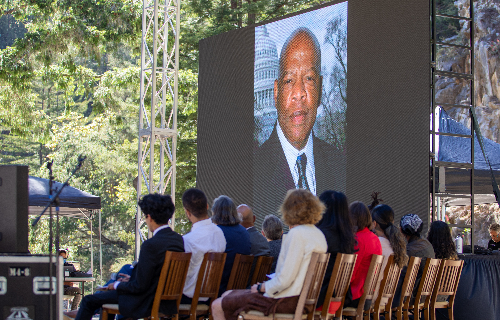
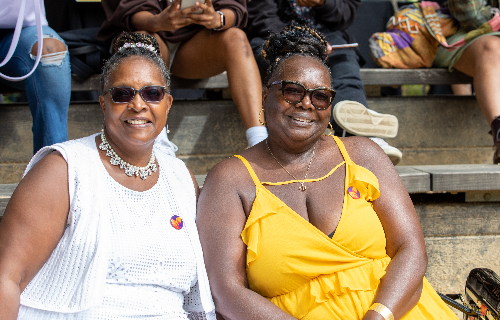
Hundreds of campus and regional community members gathered beneath the redwoods encircling Quarry Amphitheater to watch the former College Ten make history, rededicating itself as John R. Lewis College in memory of the legendary civil rights leader.
“Naming is a unique act,” said Chancellor Cynthia Larive at the ceremony. “It allows us to honor the past and aspire to the future. We’re proud to have the opportunity to live up to the name John R. Lewis. Representative John R. Lewis was an icon in this country’s historic struggle for freedom, equality, democracy, and basic human rights for all.”
The crowd gathered in a festive atmosphere under sunny skies to be inspired by powerful speakers and witness history in the making—and, true to UC Santa Cruz’s roots and John R. Lewis’s practice, students engaged in protest and let their voices be heard at the event, advocating for labor rights, housing, basic needs support, and mental health care.
Speakers included UCSC Professor Emeritus and Sociologist John Brown Childs; Rev. Dwight Andrews of the First Congregational Church of Atlanta, who was a friend of Lewis’s; award-winning poet Terisa Siagatonu (John R. Lewis ’11, community studies); organizer, political strategist, and jazz singer LaTosha Brown; civil rights advocate Wisdom Cole (Oakes ’15, chemistry); and UC President Michael Drake.
Drake said he had the honor of meeting and spending time with Lewis a few years ago.
“It was a special joy, and the fact that the university is coming together to name this college for him to serve as a platform for remembering his name and remembering his work as we go forward I think is something that we’re all very proud of,” Drake said.
Supporting the fight
This ceremony, honoring the first UC Santa Cruz college to be named after a person of color, took place 57 years after John R. Lewis set off on a march from Selma, Ala., to Montgomery with 600 people.
The peaceful demonstrators faced tear gas and beatings at the hands of state troopers, sheriff’s deputies, and others at the end of Edmund Pettus Bridge. And though Lewis was badly wounded, the march renewed his determination to fight for racial equity, a mission that sustained him throughout his life.
Lewis became an organizer whose bravery and conviction helped pave the way for the Civil Rights Act of 1964 and the Voting Rights Act of 1965.
He later served 30-plus years in the House of Representatives, where he became known as the “conscience of Congress” for his commitment to justice and equity.
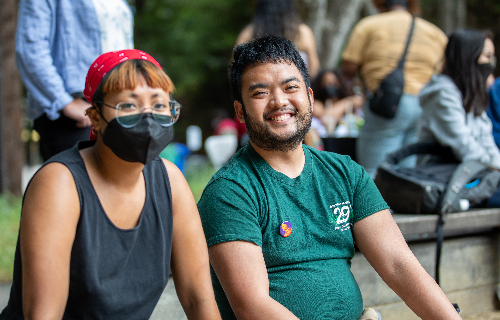
Rolanda Pierre Dixon, a lawyer from San Jose, and her sister Adrienne Pierre, a retired counselor for De Anza College, came to the event to honor Lewis and support the fight for civil rights.
“We just want to kind of keep these things going and understand that we have to honor those that came before us,” said Pierre Dixon. “And … even though the fight continues, these people put their lives on the line, and we have to recognize the kind of battle it’s going to take.”
Gamliel Urlanda (Oakes ’21, mathematics) of Santa Cruz and student Ino Salva (Merrill ’23, psychology and critical race and ethnic studies) are part of the student organization Bayanihan, which Urlanda said is partnered with the Black Student Union (BSU). They attended the event in support of the BSU.
“Their causes are also our causes,” said Urlanda. “We want to make sure we help each other as people of color on campus.”
Honor and responsibility
The naming was made possible by a gift from donors who prefer to remain anonymous. The gift established a permanent endowment that will provide resources in perpetuity for programming and other needs of the college under the direction of the college provost.
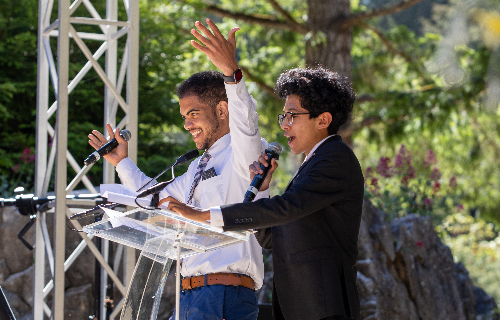
This is the first college that UCSC has named since 2016, when College Eight was named for the pioneering environmentalist Rachel Carson, a marine biologist best known for her groundbreaking nonfiction book Silent Spring.
“To have a college in [John Lewis’s] name is both an incredible honor and responsibility,” said Larive. “This naming affirms our deep commitment to help students become agents for justice, equity, inclusivity, and social change, and challenges us to live the spirit of activism embodied by Representative Lewis.”
The need for that kind of activism in the current political climate was reflected in speakers’ remarks.
“This dedication comes at a tumultuous time for our country,” said President Drake. “We are confronting intense personal, professional, and political challenges every day. We’re still in the midst of an unrelenting global pandemic. We continue to witness and live the brutal realities of intolerance, racism, and injustice.”
But, said Drake, John Lewis showed us that there can be hope, even in hard times.
“Today more than ever we need John Lewis’s spirit, his worldview of compassion, his willingness to do hard, practical work of making freedom, justice, and equality real. Our democracy today faces severe, perilous challenges,” said Brown Childs. ” … To meet these challenges, let us honor him as an icon, but let us also be inspired by him as a guide in dangerous times.”
Referring to recent laws enacted to restrict voting and reproductive health care, Andrews called the dedication “a powerful moment, a response to all of the backward steps that are going on in our nation and in our world.
“I often say that we are in the midst of a pandemic of pandemics,” Andrews continued. “Not just the coronavirus, but the economic virus, the educational crisis, the crisis of violence that strikes at the very core of our sense of safety and wellbeing, all of these crises are creating an epidemic of pandemics, all converging at the same time, so we need to be here today.”
LaTosha Brown challenged the audience to imagine an America without racism, and said changing the world is not about politics, but about humanity.
“How will we stand in a space of our humanity where it becomes real?” Brown asked. “One way that we can all check ourselves is are we giving ourselves grace, and space? What’s so wrong with a little grace? What’s so wrong with a little space? Giving ourselves and each other the space to shift, to learn, to grow, to evolve.”
Students speak
As part of the program’s call to action, representatives of the Black Student Union spoke, addressing Chancellor Larive and President Drake.
Xaul Starr, also known as X (Stevenson ’22, Earth science; Black studies minor), BSU president, and Airielle Silva (John R. Lewis College ’25, critical race and ethnic studies; Black studies minor), BSU chair of political and cultural affairs, pressed campus administrators for urgency in addressing Black students’ needs and demands.
“This is where the frustration kicks in,” said Starr. “The frustration of [un]kept promises, the long-awaited meetings that never seem to happen, the pile of work, advocacy, labor, tireless nights that fall onto students to make sure that the administration follows through on the work that they should be doing to see their students survive.”
After the event, Chancellor Larive said that campus leaders are continuing to work closely with student leaders to address identified needs within the university’s control and help champion changes that are needed beyond our campus.
The former College Ten had already distinguished itself as a place where future leaders and activists can immerse themselves in the theory and practice of effective, on-the-ground activism. All entering students take courses examining the roots of prejudice and violence; learn to think critically about privilege, inequality, and forms of resistance; and embrace their shared humanity.

But now the college—one of the 10 living-and-learning communities, or colleges, at UC Santa Cruz that enhance the intellectual and social life of the campus—is receiving additional funding to support student programming, publicity, and an outpouring of support.
At the same time, it’s positioning itself to attract more of the politically active students it has been educating, nurturing, and inspiring since its founding in 2002, and raising funds to bolster its anonymous $5 million endowment gift.
“Now is the time not only to highlight and uplift the work that College Ten has been doing for the past 20 years, but also infuse the values of John R. Lewis into our existing curriculum initiatives,” said Sarah Woodside Bury, senior director for college student life at College Nine and John R. Lewis, Cowell, and Stevenson colleges.